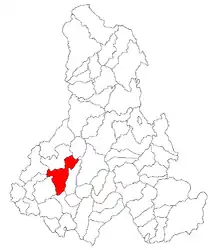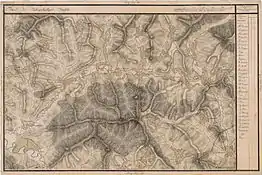Lupeni, Harghita
Lupeni (Hungarian: Farkaslaka, Hungarian pronunciation: [ˈfɒrkɒʃlɒkɒ], meaning "Wolf's Home") is a commune in Harghita County, Transylvania, Romania. It lies in the Székely Land, an ethno-cultural region in eastern Transylvania.
Lupeni
Farkaslaka | |
|---|---|
 Coat of arms | |
 Location in Harghita County | |
 Lupeni Location in Romania | |
| Coordinates: 46°22′47″N 25°13′33″E | |
| Country | |
| County | Harghita |
| Government | |
| • Mayor | Lehel Kovács[1] (UDMR) |
| Area | 125.21 km2 (48.34 sq mi) |
| Population (2011)[2] | 4,473 |
| • Density | 36/km2 (93/sq mi) |
| Time zone | EET/EEST (UTC+2/+3) |
| Postal code | 537165 |
| Area code | +40 266 |
| Vehicle reg. | HR |
| Website | www.farkaslaka.ro |
Geography
Lupeni is situated on the Feernicul (Hungarian: Fehér Nyikó) stream, 13 km northwest of Odorheiu Secuiesc on the road to Corund and Sovata. The usually small Fehér Nyikó stream became so swollen in the catastrophic floods of 2005 when 11 centimeters (4.3 inches) of rain fell in the space of two hours, that three people lost their lives when they were swept away as the water rose over four meters.[3][4]
Component villages
The commune is composed of nine villages:
| In Romanian | In Hungarian |
|---|---|
| Bisericani | Székelyszentlélek |
| Bulgăreni | Bogárfalva |
| Firtușu | Firtosváralja |
| Lupeni | Farkaslaka |
| Morăreni | Nyikómalomfalva |
| Păltiniș | Kecset |
| Păuleni | Székelypálfalva |
| Satu Mic | Kecsetkisfalud |
| Sâncel | Szencsed |
History
The commune was historically part of the Székely seat of Udvarhelyszék until 1876. After the administrative reform in the Kingdom of Hungary it became a part of the Udvarhely County until 1918. In 1920, the villages, like the rest of Transylvania, formally passed with the Treaty of Trianon from Hungarian to Romanian control. The commune was temporarily incorporated into Hungary, between 1940 and 1944, along with Northern Transylvania under the Second Vienna Award. Between 1952 and 1960, it formed part of the Hungarian Autonomous Province, then, of the Mureș-Hungarian Autonomous Province until it was abolished in 1968. Since then, the commune has been part of Harghita County.
Demographics
The commune has an absolute Székely (Hungarian) majority. According to the 2002 census it has a population of 4,434 of which 99.28% or 4,402 are Hungarian.[5] In 2004, half of the population of the village was engaged in charcoal burning as their principal business.[6]
Notable people
Lupeni is the birthplace of the famous Hungarian writer Áron Tamási (1897–1966), known for such works as Címeresek and the Ábel trilogy.
Landmarks
- The Roman Catholic church was built between 1842 and 1848 in classicist style in the honour of Saint John of Nepomuk
- The grave of Áron Tamási (1897–1966), Székely writer, can be seen between two Turkey oaks behind the church, his memorial is the work of Jenő Szervátiusz and Tibor Szervátiusz. Today, his birthhouse is open to the public as a museum.
Gallery
 As Palfalva (Păuleni) and Firtos Varallya (Firtuşu) on Josephinische Landaufnahme, 1769-73
As Palfalva (Păuleni) and Firtos Varallya (Firtuşu) on Josephinische Landaufnahme, 1769-73 As Farkaslaka (Lupeni), Kecset (Păltiniş), Kis Falu (Satu Mic) and Szent Lélek (Bisericani) on Josephinische Landaufnahme, 1769-73
As Farkaslaka (Lupeni), Kecset (Păltiniş), Kis Falu (Satu Mic) and Szent Lélek (Bisericani) on Josephinische Landaufnahme, 1769-73
References
- (in Romanian) alegeri.tv - Alegeri locale 2012 - Rezultate alegeri Primăria Lupeni, judeţul Harghita Archived 2016-06-16 at the Wayback Machine; retrieved on February 6 2014
- "Populaţia stabilă pe judeţe, municipii, oraşe şi localităti componenete la RPL_2011" (in Romanian). National Institute of Statistics. Retrieved 4 February 2014.
- Juhász, András, Catastrophe near by the rivulet Fehér-Nyikó and Became a vale of tears, Weather Underground, wunderground.com, 2005-9-17. Accessed 2012-4-24.
- Basescu, Traian, Not ready for changed climate, Google translation of the archived article Nu suntem pregătiţi pentru noul tip de climă, gandul.info via archive.org, 2005-8-27. Accessed 2012-4-25.
- "Etnikai statisztikák" (in Hungarian). Árpád E. Varga. Retrieved 27 May 2010.
- János András Vistai. "Tekintő – Erdélyi Helynévkönyv". p. 293. Missing or empty
|url=(help)Transylvanian Toponym Book
